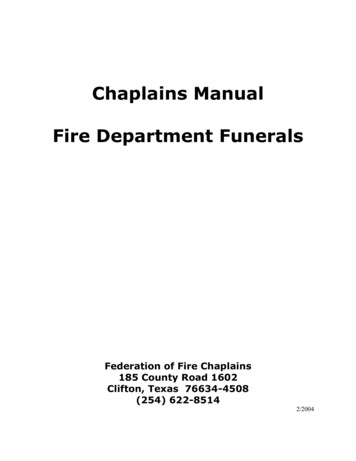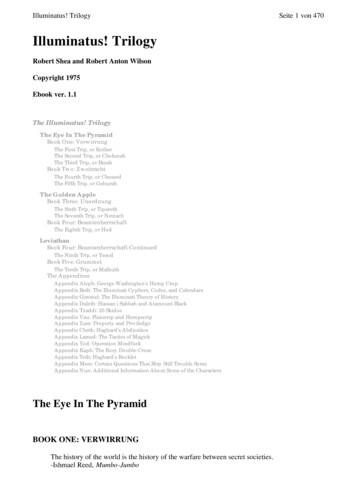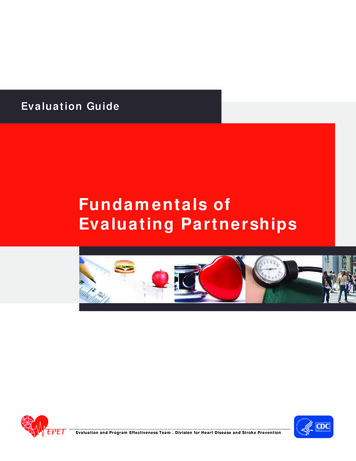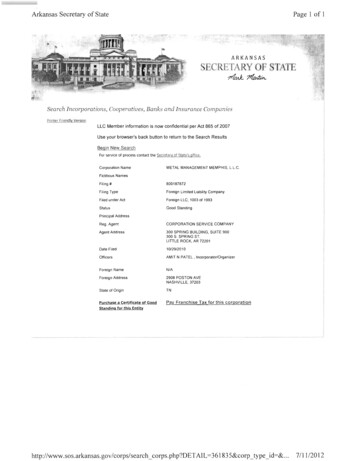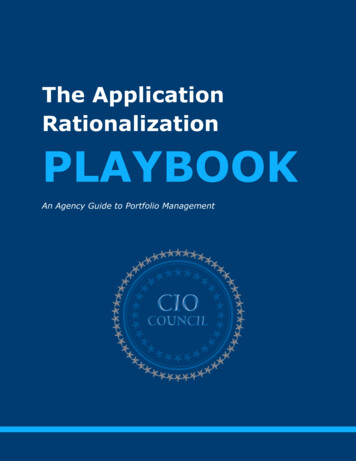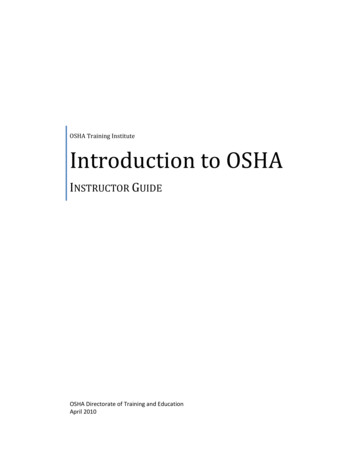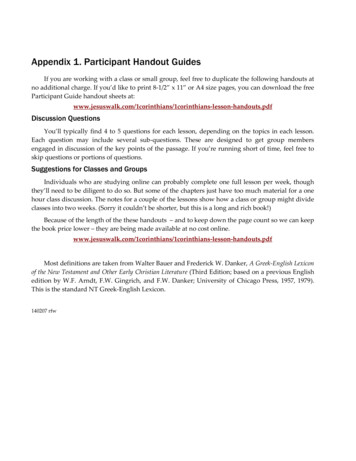
Transcription
Appendix 1. Participant Handout GuidesIf you are working with a class or small group, feel free to duplicate the following handouts atno additional charge. If you’d like to print 8‐1/2” x 11” or A4 size pages, you can download the freeParticipant Guide handout sheets esson‐handouts.pdfDiscussion QuestionsYou’ll typically find 4 to 5 questions for each lesson, depending on the topics in each lesson.Each question may include several sub‐questions. These are designed to get group membersengaged in discussion of the key points of the passage. If you’re running short of time, feel free toskip questions or portions of questions.Suggestions for Classes and GroupsIndividuals who are studying online can probably complete one full lesson per week, thoughthey’ll need to be diligent to do so. But some of the chapters just have too much material for a onehour class discussion. The notes for a couple of the lessons show how a class or group might divideclasses into two weeks. (Sorry it couldn’t be shorter, but this is a long and rich book!)Because of the length of the these handouts – and to keep down the page count so we can keepthe book price lower – they are being made available at no cost ‐lesson‐handouts.pdfMost definitions are taken from Walter Bauer and Frederick W. Danker, A Greek‐English Lexiconof the New Testament and Other Early Christian Literature (Third Edition; based on a previous Englishedition by W.F. Arndt, F.W. Gingrich, and F.W. Danker; University of Chicago Press, 1957, 1979).This is the standard NT Greek‐English Lexicon.140207 rfw
1 Corinthians: Discipleship Lessons for a Troubled Church2Introduction to 1 CorinthiansThe City of CorinthThe ancient city of Corinth only one and a half miles south ofthe Isthmus of Corinth, a narrow land bridge (only 3.9 miles or 6.3kilometers wide), which connects the Peloponnesian peninsula tothe Greek mainland. Thus Corinth became prosperous from trade– both the trade moving by sea east and west, but also north andsouth between Greece and the Peloponnesus.Ruins of the Temple of Apollo, dating to the sixth century BC,can still be seen. Shops and monuments lining the Agora, largerthan the Forum in Rome, also persist. To the south, the Acro‐Corinthian fortress at the height of 1,886 feet could control all thetrade routes.At its peak stood the Temple of Aphrodite, goddess of love and beauty, where 1,000 femaleprostitutes served, contributing to the city’s reputation for immorality. In fact, the coined Greekword “to Corinthianize” meant to practice immorality and the phrase “Corinthian girl” designateda prostitute.The Romans conquered and destroyed Corinth in 146 BC. In 46BC, Julius Caesar re‐founded it as a Roman colony. In 27 AD, itbecame the seat of government for the Roman province of Achaia.As a Roman colony, its citizens were primarily Romans, perhapsfreedmen from Italy, but its population also included Greeks anda considerable Jewish community. As a chief trade center, itwould become a strategic base of operations for Paul, since hewould meet and minister to many people travelling through,causing the gospel to spread even farther.Temple of Apollo and ruins in Corinth.Source: BiblePlaces.comFounding of the Corinthian ChurchPaul firstvisited Corinth about 50 AD, during the lastphase of his second missionary journey, afterstarting churches in Macedonia – Philippi,Thessalonica, and Berea (Acts 16‐17). He cameto Corinth after visiting Athens and stayedwith a couple of Jewish tentmakers, Aquilaand Priscilla, who had recently been forced toleave Rome due to an edict by EmperorClaudius (about 49 AD; Acts 18:2‐3). Paul wasjoined in Corinth by Silas and Timothy. Undertheir ministry the church grew. Paul seems tohave been in danger during this time (Acts 18:9‐10).
1 Corinthians: Discipleship Lessons for a Troubled Church3When the Jews appealed to the Roman proconsul Gallio (in office 51 to 52 AD) to force Paul toleave, they were rebuffed (Acts 18:11‐17). Paul left Corinth probably in the spring of 52 AD, givinghim two years there. After leaving Corinth, Paul stopped at Ephesus and then returned to Antioch.From there he went to Jerusalem (Acts 20:18‐22).Situation at the Time of the LetterThe congregation in Corinth developed into a large church made up of house churchcongregations scattered across the city. We read:“Many of the Corinthians who heard Paul became believers and were baptized. One nightthe Lord said to Paul in a vision, ‘Do not be afraid, but speak and do not be silent; for I amwith you, and no one will lay a hand on you to harm you, for there are many in this city whoare my people.’” (Acts 18:8‐10)Because of the types of problems Paul writes to the church about, it appears that they werepredominately Gentile, made up of a broad mix of social levels. In the intervening years, Paul wasin the midst of a very successful mission in Ephesus that reached people all over the province ofAsia Minor.Now the church was troubled and at odds with its founding apostle. Ironically, the centralissue was what it meant to be “spiritual.” Problems included:1. Competing allegiances to various leaders – Apollos, Paul, and Peter – that caused disunityand divisions (1:10‐17; 3:1‐23; 4:1‐7).2. A pride in a Hellenistic understanding of philosophy and rhetoric, rather than in the simplegospel (1:18‐2:16; 3:18‐32).3. A rejection of Paul’s apostolic authority over them (4:8‐21).4. Pride in their tolerant attitude towards sexual immorality (5:1‐13).5. Rejection of the church’s authority to settle disputes, rather taking them to public courts(6:1‐8).6. Immorality with prostitutes (6:9‐20; 10:1‐13).7. Rejection of marriage and celibacy (7:1‐40).8. Idolatry and eating of food sacrificed to idols (8:1‐13; 10:14‐11:1).9. Offence at Paul refusing sponsorship but rather making the gospel free of charge (9:1‐27).10. Rebellion in hair styles and coverings (11:2‐16).11. Casual disregard for the proper receiving of the Lord’s Supper (11:17‐34).12. Exaltation of tongues over other important spiritual gifts (such as prophecy),misunderstanding the nature of the church as a body (12‐14).13. Disorder in church meetings (14:26‐40).14. Disbelief in the resurrection of the dead (15:1‐58)
1 Corinthians: Discipleship Lessons for a Troubled Church4Tone of the Letter1 Corinthians is the strongest exhortation of any of the Pauline letters that have survived,though it is not the first he has written them. For most of our letter Paul is engaged in correction,chiding, shaming, explaining, defending, exhorting, arguing, and pleading.Groups within the Church at Corinth Rich and the poor are visible when Paul corrects them concerning their observance of theLord’s Supper (11:18‐22). Carnal and the super‐spiritual. On the one hand Paul corrects people who are accustomedto going to prostitutes (chapter 6) and on the other hand he corrects people who see sex inmarriage as somehow below their exalted spiritual state (chapter 7). Pagans and Jews. Though the church began with people from the synagogue – both Jewsand uncircumcised worshippers who attended the services (Acts 18:4‐8) – most of thegrowth in the congregation after that seems to have come from the pagan population (12:2). Uneducated and sophisticated. While the congregation seems to be primarily people fromthe lower classes (1:26), some showed considerable sophistication in arguing why theyshould continue in their ways (chapter 6). There certainly was a group that was impressedwith classical standards of philosophy and rhetoric (chapters 2‐3). Slave and free. A number in the congregation were probably freedmen, though many wereslaves (7:20‐22).Date and Place of WritingFirst Corinthians was probably written from Ephesus about 55 AD and carried to Corinth byStephanas, Paul’s first convert in Achaia. Second Corinthians was probably written fromMacedonia a year later.
1 Corinthians: Discipleship Lessons for a Troubled Church51. Healing Church Divisions (1 Corinthians 1:1-17a)Q1. (1 Corinthians 1:2) “What does “called to be holy” or “called to be saints” mean? What is asaint according to the Bible? Why is it so comfortable for us to say, “I’m no saint”? What isexpected of a person who has been set apart as the personal property of the living God? Whatkind of behavior does the world expect of those who claim to be followers of Christ?Q2. (1 Corinthians 1:4‐7) How often do you thank God for the blessings of those who don’t likeyou, or of your actual enemies? What does it say about Paul that he thanks God for the gifts ofthose who are at odds with him? What specifically does he thank God for about the Corinthianbelievers?Paul describes four ways in which God keeps us in Christ for that Day (1:8‐9)1. Strength. Bebaioō, “to make a person firm in commitment, establish, strengthen.”2. Forgiveness. Anenklētos, “that cannot be called to account, unreprovable, unaccused.”3. Faithfulness. pistos, “worthy of belief or trust, trustworthy, faithful, dependable, inspiringtrust/faith.” (Lam 3:22‐23; 2 Tim 2:13)4. Fellowship. Koinōnia, “close association involving mutual interests and sharing, association,communion, fellowship, close relationship.” The word is also used to describe“participation, sharing” that goes on in a partnership.Q3. (1 Corinthians 1:8‐9) What gifts does God give us to ensure that we’ll continue in faith untilthe end? Why does each require our active participation to receive its full benefits? Which doyou need to enter into more?Q4. (1 Corinthians 1:10‐12)What kind of divisions do you see in your congregation or in theChristian community in your area? What is the cause of the divisions in Corinth? What is thecause of divisions today? How do we obey the command to “agree with one another” (1:10)?Key Verses“He will also strengthen you to the end, so that you may be blameless on the day of our LordJesus Christ.” (1 Corinthians 1:8)Now I appeal to you, brothers and sisters, by the name of our Lord Jesus Christ, that all of you bein agreement and that there be no divisions among you, but that you be united in the same mindand the same purpose.” (1 Corinthians 1:10)“
1 Corinthians: Discipleship Lessons for a Troubled Church62. Human vs. Spiritual Wisdom (1 Corinthians 1:17b-2:16)Paul is dealing with wisdom as understood by the various schools of Greek philosophy thatcaptured the common mind in Corinth. Epicureans saw religion as irrelevant and saw the pursuit of pleasure as the primary good. Middle Platonists followed Plato in their belief in the immortal human soul that needed tobe freed from its attachment to the body and ascend towards deity. Paripatetics followed Aristotle who rejected Plato’s concept of an immortal soul. Sotics were materialists who believed even the gods had a material substance. An importantquestion for them was, “How can the wise man live in accordance with nature?” Answer:through a virtuous life. Cynics espoused more a way of life than a philosophy, living with only the barest essentials.They were known by their ragged cloaks and begging, and often being caustic, abusive, andarrogant.In Greek culture, oratorical performance was valued highly. Indeed, the Greeks had developedthe whole science of rhetoric, the art of persuasive speech.Focus on the Christ Crucified Message of the cross (1:17‐18) Jesus Christ and him crucified (2:2) Christ died for our sins (15:3‐4)Q1. Name four value differences between Christian teaching and the values you see pushed tous on television. Example: Sex between consenting adults is okay, vs. sex belongs in marriage.Now name four more.Q2. (1 Corinthians 1:21‐25) In what areas do non‐Christians in our culture stumble over the basicgospel of Christ? To what degree can we help bridge this gap through careful and creativepresentation? To what degree might that be “watering down” the gospel? Why can’t we escapethe tension between culturally‐relevant communication and changing the essence of themessage?1. Wisdom (sophia). Christ’s values, his thoughts, his guidance are all wisdom for us.2. Righteousness (dikaiosynē) – the state of people who are in right standing before God,without any unforgiven sins.3. Holiness or sanctification (hagiasmos) – “personal dedication to the interests of God,holiness, consecration, sanctification,”4. Redemption (apolytrōsis) – literally, “buying back” a slave or captive – “release from acaptive condition, release, redemption, deliverance.”
1 Corinthians: Discipleship Lessons for a Troubled Church7Q3. (1 Corinthians 1:30‐31) In what way does Christ represent God’s wisdom, righteousness,holiness, and redemption? How far do these go to lay the basis of a truly Christian philosophicalsystem?Paul declares the things he did not bring to them in his preaching, that he specifically rejects.1. Eloquence or lofty words, that is, a refined oratorical style (2:1).2. Wisdom – at least, wisdom as would be perceived as such by the Greek philosophers (2:1).3. Persuasive words of wisdom. Paul didn’t present a sales pitch (2:4).He also declares what he did bring them in his preaching.1. Testimony about God (2:1).2. Focus on “Jesus Christ and him crucified” (2:2).3. Weakness, fear, and trembling (2:3).4. Demonstration of the Spirit’s power (2:5‐6).Q4. (1 Corinthians 2:1‐6) Why didn’t Paul conform to the rhetorical standards of his day in orderto communicate more clearly? What is the danger of “repackaging” the message? What does itmean that Paul relied on a demonstration of the Spirit’s power?Q5. (1 Corinthians 2:9‐16). Explain how we can “have the mind of Christ.” How does this work,according to these verses? How does having the Holy Spirit “circulating” through our mindsexplain spiritual gifts working through us?Key Verses“The message of the cross is foolishness to those who are perishing, but to us who are being savedit is the power of God.” (1 Corinthians 1:18)“It is because of him that you are in Christ Jesus, who has become for us wisdom from God–thatis, our righteousness, holiness and redemption.” (1 Corinthians 1:30)“I resolved to know nothing while I was with you except Jesus Christ and him crucified.” (1Corinthians 2:2)“My message and my preaching were not with wise and persuasive words, but with ademonstration of the Spirit’s power, so that your faith might not rest on men’s wisdom, but onGod’s power.” (1 Corinthians 2:4‐5)“. God has revealed it to us by his Spirit. The Spirit searches all things, even the deep things ofGod.” (1 Corinthians 2:10)“‘For who has known the mind of the Lord that he may instruct him?’ But we have the mind ofChrist.” (1 Corinthians 2:16)
1 Corinthians: Discipleship Lessons for a Troubled Church83. Building a Healthy Church on Christ’s Foundation (1 Corinthians 3)“Spiritual” is pneumatikos. In classical Greek the word refers to spirit as the inner life of ahuman being. But in the New Testament, the word means “having to do with the Divine Spirit,caused by or filled with the Divine Spirit, pertaining to or corresponding to the Divine Spirit.” Hereit means something like “possessing the Spirit, the one who possesses the Spirit.”“Worldly” (NIV), “people of the flesh” (NRSV), “carnal” (KJV) is sarkinos, found in 3:1, 3, and4, literally, “consisting/composed of flesh, fleshy,” here, figuratively, “earthly, mediocre, merelyhuman, worldly.”Q1. (1 Corinthians 3:1‐3) In behavioral terms according to these verses, how would you classifyyourself in terms of hunger for the Word? In terms of jealousy and quarreling? – infant, child,teenager, adult? What will it take for you to grow to the next stage?Q2. (1 Corinthians 3:4‐9) In what ways do denominations encourage Christian unity? In whatways do they foster disunity? Does belonging a “non‐denominational” church make anydifference regarding unity throughout the body? How can we tear down the barriers that divideus?The temples built by Solomon, and later by Herod, were made of fine materials – “gold, silver,costly stones.” In the temple, gold and silver plated many surfaces. The “costly stones” aren’tjewelry here, but quarry‐cut stones such as limestone and marble that were reserved for the finestbuildings – such as the temple (Mark 3:1). Wood was expensive, since it was rare in many places. Itwas used for lintels or rafters. However, wood would burn, while metals and stones would not.“Hay or straw“ were legitimate components to strengthen the mud bricks that constituted mostof the buildings in the Mediterranean region. Straw provided a binding substance to keep bricksand large pieces of pottery from cracking when they dried (Exodus 5:10‐18). The test will be the fireof the Day of the Lord, the Day of Judgment (2 Peter 3:10).Q3. (1 Corinthians 3:9‐13) In terms of building congregations in our day, how would you assessquality vs. slip‐shod building materials and methods? How important is improving yourministry skills through training? Prayer? Practice? Diligence? Faithfulness? Doctrinal accuracy?Devotional life? Openness to spiritual gifts? Etc.“Reward” is misthos, literally, “remuneration for work done, pay, wages,” then by extension,“recognition (mostly by God) for the moral quality of an action, recompense.”“Suffer loss” (NIV) is zēmioō, in classical Greek, “to cause injury or inflict punishment,” here “toexperience the loss of something,” with implication of undergoing hardship or suffering, “sufferdamage/loss, forfeit, sustain injury.” Perhaps the idea of “be punished” is also present.“Saved” is sōzō, “to save or preserve from transcendent danger or destruction, save/preservefrom eternal death.” Christ’s salvation sustains us, even though the image is escaping from aburning house. We escape with nothing, perhaps not even the clothes on our back.
1 Corinthians: Discipleship Lessons for a Troubled Church9Rewards. Ephesians 2:8‐9; Matthew 25:14‐30; Luke 19:12‐27; Romans 14:10, 12; 2 Corinthians5:10; Matthew 5:12; 6:1; 10:41; 1 Corinthians 3:8, 14); 2 John 8; Revelation 11:18.The idea of receiving rewards for our good works here on earth is embarrassing to modern‐dayChristians for two reasons: (1) free grace (Ephesians 2:8‐9) and (2) sincere love (Matt 22:37).“Destroy” (NIV, NRSV), “defile” (KJV) occurs twice in verse 17, in both instances using the verbphtheirō. Literally, the verb means, “to cause harm to in a physical manner or in outwardcircumstances, destroy, ruin, corrupt, spoil.” The word is used to describe ruining financially,seducing a virgin, bribing an official so as to corrupt him, tracking dirt on a carpet to ruin or spoilit, breaking the rules of a contest, etc. The second time the word is used (“God will destroy him”) ithas the idea of “to inflict punishment, destroy,” in the sense “punish with eternal destruction.”Q5. (1 Corinthians 3:17) Division and church splits injure people, especially tender newbelievers. Why do you think there is such a harsh punishment for those involved in hurtingChrist’s church? What are better ways to deal with differences in the church?Key Verses“Brothers, I could not address you as spiritual but as worldly – mere infants in Christ. (1Corinthians 3:1)“I planted the seed, Apollos watered it, but God made it grow. So neither he who plants nor hewho waters is anything, but only God, who makes things grow. The man who plants and the manwho waters have one purpose, and each will be rewarded according to his own labor.” (1Corinthians 3:6‐8)“Each one should be careful how he builds. For no one can lay any foundation other than the onealready laid, which is Jesus Christ.” (1 Corinthians 3:10b‐11)“The fire will test the quality of each man’s work. If what he has built survives, he will receive hisreward. If it is burned up, he will suffer loss; he himself will be saved, but only as one escapingthrough the flames.” (1 Corinthians 3:13b‐15)“Don’t you know that you yourselves are God’s temple and that God’s Spirit lives in you? Ifanyone destroys God’s temple, God will destroy him; for God’s temple is sacred, and you are thattemple.” (1 Corinthians 3:16‐17)
1 Corinthians: Discipleship Lessons for a Troubled Church104. The Struggles and Joys of Christian Leaders (1 Corinthians 4)Paul uses two titles to describe his role in 4:1‐2:“Servant” (NIV, NRSV), “minister” (KJV) is hypēretēs, frequently used as technical term for agovernmental or other official, “one who functions as a helper, frequently in a subordinate capacity,helper, assistant.” Hypēretēs suggests administering the affairs of another.“Steward” (NRSV, KJV), “one entrusted” (NIV) is oikonomos, “manager of a household orestate, (house) steward, manager.” Figuratively, this word refers to “one who is entrusted withmanagement in connection with transcendent matters, administrator.” Titus 1:7; 1 Peter 4:10.Q1. (1 Corinthians 4:1‐2) In what sense is a Christian worker a “steward”? Have you ever met aChristian worker who wasn’t faithful? What effect did this have on the church? On this person’switness. What are the reasons we are sometimes unfaithful in our area of ministry? What can wedo to remedy that?Q2. (1 Corinthians 4:3‐5) Why doesn’t Paul care how others judge him? Why doesn’t Paul judgehimself? Why are our motives so important in God’s judgment process? Do you see God as aharsh judge? An easy judge? Why?Q3. (1 Corinthians 4:9‐13) Why do you think Paul lists the abuse he has to take? What effect didhe want it to have on his readers? What effect does it have on you? Do you avoid ministry thatcomes with abuse?Q4. (1 Corinthians 4:17) What qualities about Timothy encouraged Paul to send him on asensitive mission to the Corinthians – that might have involved some disrespect and abuse? IfGod were to call you to fulfill a sensitive mission – to a neighbor or across the world – wouldyou accept? Why or why not?Key Verses“It is required of stewards that they be found faithful.” (1 Corinthians 4:2, ESV)“Judge nothing before the appointed time; wait till the Lord comes. He will bring to light what ishidden in darkness and will expose the motives of men’s hearts. At that time each will receive hispraise from God.” (1 Corinthians 4:5)“What do you have that you did not receive? And if you did receive it, why do you boast asthough you did not?” (1 Corinthians 4:7b)“I urge you to imitate me.” (1 Corinthians 4:16)“The kingdom of God is not a matter of talk but of power.” (1 Corinthians 4:20)
1 Corinthians: Discipleship Lessons for a Troubled Church115. Confronting Immorality in a Cleansed Church (1 Corinthians 5)Wives must be chaste, for one thing. And for men, adultery was frowned upon with the wivesof other men and with underage free‐born females. Beyond that, however, a married man thoughtnothing of sex with prostitutes or with his slave girls. It was taken for granted. Corinth was home tothe Temple of Aphrodite, goddess of love and beauty, where 1,000 female prostitutes served,contributing to the city’s reputation for immorality. In fact, the coined Greek word “toCorinthianize” meant to practice immorality, and the phrase “Corinthian girl” designated aprostitute.Homosexuality seems to have been accepted in both Greek and Roman cultures. Among theupper classes at least, older men would mentor adolescent boys, as well as use them sexually – apractice known as pederasty. Homosexual relations wouldn’t be looked down upon – at least forthe dominant partner. An effeminate partner, however, would lose status if his role were known.There is some evidence of female homosexuality, both on the Island of Lesbos (from which we getour word “lesbian”) and in Sparta, but references in ancient literature are few.There are two problems that Paul has to deal with:1. The member’s sexual immorality.2. The church’s tolerance of this relationship.Q1. (1 Corinthians 5:1‐2a) Why do you think the Corinthians were so proud of their tolerance ofimmorality? What does this say about their value system?Several elements that are found in both our passage and 1 Timothy 1:19‐20:1. Gross, unrepented of, sin. Love covers a multitude of sins (1 Peter 4:8). But what we cannottolerate is blatant, proud, sin over which people feel no sorrow or willingness to repent. Thisdestroys the community. Matthew 18:15‐17.2. Excommunication, exclusion from the Christian community. The verb is exairō, “to excludeor remove someone from a group, remove, drive away.” Excommunication may be required forseveral reasons: (1) to protect the body from this pernicious influence, (2) to maintain standards ofChristian behavior within the congregation, and (3) to get the attention of the sinner so that he willhopefully repent.3. Deliverance to Satan for instruction. The verb is paradidōmi, “hand over, turn over, give up aperson,” as a technical term of police and courts, “hand over into the custody of.”Q2. (1 Corinthians 5:2b‐5) What are levels of correction and discipline short ofexcommunication? Who should exercise that kind of correction? What do we do when a sinningmember repents? Why is excommunication sometimes necessary? Why are we so unwilling toexercise it in our day?
1 Corinthians: Discipleship Lessons for a Troubled Church12Q3. (1 Corinthians 5:6‐7) How does the presence of openly sinning members affect others in thebody? We might use the analogy of a “bad apple.” What in Paul’s background might explain hisuse of “getting rid of yeast”?Sins of Unbelievers (5:10)Sins of Believers (5:11)Sins in 6:9‐10Sexually immoralSexually immoralSexually immoralAdulterersMale prostitutesHomosexual unkardDrunkardsAssociating with sinners. Luke 5:31‐32; Matthew 7:1l John 8:7; Matthew 18:17; 1 Thessalonians 2:15;1 Corinthians 15:33‐34.Guidelines:1. Love and restoration. We are to love people, even lapsed Christians. We are to seek torestore Christians who have sinned or fallen away.2. Spending time to minister. Sometimes, restoring those who have fallen away (or the lost)means spending time with them (Luke 5:29‐32; 19:5‐10; 11:37‐50; 14:1‐14).3. Not fellowshipping. When believers are so hardened that they reject appeals to repent fromboth fellow Christians and from the church body, then you are not to spend time with them –except from regular business dealings that might be necessary.Q4. (1 Corinthians 5:9‐13) According to this passage, with which sinners should we be willing toassociate? Why make a distinction between unbelievers and believers? What are the dangers ofassociating with unbelievers? What are the dangers of associating with unrepentant believers?Key Verses“I wrote to you in my letter not to associate with sexually immoral persons— not at all meaningthe immoral of this world, or the greedy and robbers, or idolaters, since you would then need togo out of the world.” (1 Corinthians 5:9‐10)“But now I am writing to you not to associate with anyone who bears the name of brother or sisterwho is sexually immoral or greedy, or is an idolater, reviler, drunkard, or robber. Do not even eatwith such a one.” (1 Corinthians 5:11)
1 Corinthians: Discipleship Lessons for a Troubled Church136. An Exhortation against Sexual Sin (1 Corinthians 6)Suits between Christians in civil court say to the world that:1. Love. Christians, whose prime directive is to love one another, can’t get along with eachother.2. Ethics. Christians cheat and do wrong to their brothers (6:8).3. Competence. Christians aren’t competent to settle internal disputes.Propositions1. The local church has both the responsibility and the authority to settle disputes between itsmembers.2. The church has the authority to appoint judges to consider disputes.3. God’s holy people, the saints, will be involved both in the judgment of the world at the LastDay, as well as of fallen angels.4. Christians have higher values than mere money and property concerns.Paul teaches that the local church is a:1. Field (3:5‐9).2. Building, a temple of the Holy Spirit (3:9‐17).3. Court to Decide Disputes among Members (6:1‐8).4. Body of Christ, made up of multi‐gifted members who serve as Christ’s hands and feet(chapter 12).Q1. (1 Corinthians 6:1‐8) How does it hurt the Christian cause when Christians take each other tocourt? How should disputes be settled between believers? How might this be instituted in alocal congregation? Among churches in a geographical region?Q2. (1 Corinthians 6:9‐10) What does the scripture teach here about participating in homosexualacts? What does the scripture teach about heterosexual immorality? Why is repentance soimportant for a believer?Inherit the kingdom of God (1 Cor 15:50; Matt 19:28‐29; 25:34, 46; Luke 18:18; Galatians 5:19‐21)Words in 6:11 “Washed” is apolouō, “wash something away from oneself, wash oneself,” used in imageryof purification and Christian baptism. It is used as a figure of baptism in Acts 22:16. We seethe noun loutron, “bath, washing” at Ephesians 5:26 and Titus 3:5. “Sanctified” is hagiazō, “consecrate, dedicate, sanctify,“ set apart as holy (1 Cor 6:19b‐20a). “Justified” is a legal term, dikaioō, “to render a favorable verdict, vindicate . justify, treat asjust.” There’s another connotation as well: “to cause someone to be released from personalor institutional claims that are no longer to be considered pertinent or valid, makefree/pure,” in the New Testament in the passive voice, “be set free, made pure.”
1 Corinthians: Discipleship Lessons for a Troubled Church14Q3. (1 Corinthians 6:11) Why is the gospel such good news to those who have been involved ingross sin? On what basis can a person be forgiven? On what basis can a person be cleansed fromsin?Excuses for going to prostitutes1. “Everything is permissible for me.”2.“Food for the stomach and the stomach for food”Corrections1. Not everything is beneficial to us.2. We should not be mastered by anything. “Everyone who sins is a slave to sin” (John 8:34).Paul argues:1. Our bodies are designed to serve the Lord (6:13)2. Our bodies will survive
1 Corinthians: Discipleship Lessons for a Troubled Church 4 Tone of the Letter . 1 Corinthians is the strongest exhortation of any of the Pauline letters that have survived, though it is not the first he has written th

